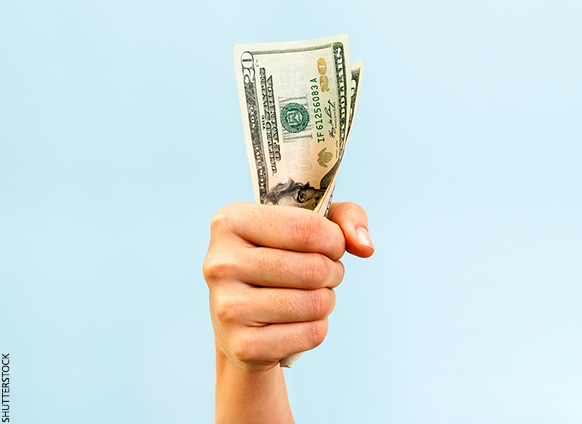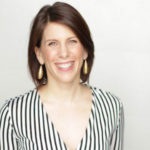Only in the past few years have I realized what financial freedom truly means to me: enough money to pay for my basic needs (including fun), plus enough in the bank to float my family in case of an emergency, and savings for the future. More important, it means I am in control of my money—where it comes from, how I use it, how it makes me feel, and whether it’s a tool for making positive changes in my life and the world.
But I was raised to think that money (or the lack of it) was in control. I grew up in an educated family, but my parents divorced when I was young, and my single mom struggled financially. I grew up with the understanding that earning money is always very, very hard. While my brothers and I never lacked when it came to music or sports lessons and trips to museums or local theaters, the overriding message was unmistakable: We are poor, and there’s not much we can do about it.
There was also a message that money would make everything better. As a family, we spent hours driving around wealthy neighborhoods and ogling lavish homes, or went to the mall, where we were often window-shopping or bargain-hunting. We always had a poverty mentality.
I left a state university with $20,000 of debt. My first newspaper reporter salary earned barely more than that sum annually. I continued to shop the bargain racks and drool over Craftsman bungalows I passed during jogs, but mortgage calculators told me that with my meager income, it would be nearly impossible to own any real estate, much less a big, beautiful house. I felt like I always had: poor.
Then I married a journalist with a modest salary, and we moved to New York City. Between new staff jobs and freelance gigs, we earned great money. I paid off my student loans, there was money in the bank, and I didn’t fret about whether the rent check would clear. We bought a big beautiful apartment with a solid 20 percent down. I tasted what not being poor felt like.
After a few years as a staff employee, I ventured into full-time freelance writing, and my relationship with money did another pivot. For the first time, the only limits to my income were my own efforts and the economy. My wings of financial freedom stretched further.
But then I got shoved out of the nest completely. I had one toddler to care for and another baby on the way when my husband and I divorced. Suddenly I had to completely support my family alone.
I was terrified. I was a single mom with few financial resources just as my mother had been. I knew I had to find a different path for my family.
I updated my website and started calling clients old and new. Before long I was making more money than I would have dreamed possible as a writer. But it wasn’t just that I had enough income; I was also working from home while being able to spend many hours playing, nursing and cooking for my kids. I was in control of my time and lifestyle.
My sense of financial empowerment continues to evolve. Over the past six years, I gradually purged my closets and cupboards of items that I gave to Goodwill. Partly as a rebellion against my upbringing as well as my marriage, in which shopping and saving things were prioritized, I like owning as few things as I can manage while investing in quality furniture, clothes and even kitchen knives that will last.
In my career, I continue to mature, having three years ago launched the blog WealthySingleMommy.com, which helps other professional single mothers find financial, romantic and parenting success. With podcasts, videos and other digital spinoffs, I rely less on clients and more on a direct connection with my audience. Financial freedom now means more than just maximizing the money in my bank accounts—it means maximizing my talents, energy and time in ways that contribute to my family, my spirit and the world.
Following are three stories about other people who have found financial freedom in unlikely ways:
Mark and Lauren Greutman
Who: Personal finance experts; parents of four; Syracuse, N.Y.
Former money relationship: Bought a pricey home, lost income and had $40,000 in debt.
Money relationship now: They live modestly within a strict budget.
Says Lauren: Nine years ago, my husband and I were 24-year-old new parents, earning close to $100,000 a year, when a vacation to North Carolina inspired us to pack up and move from Syracuse and buy a 3,600-square-foot custom home with zero percent down. We picked out every detail of the home and bought all new furniture with credit cards. In the driveway were an Audi and a Cadillac.
Two months later, I realized we’d made a huge mistake. I handled our family finances and also made most of the credit card purchases. My direct-sales cosmetics business quickly dried up while we accumulated $40,000 in credit card debt and operated at a $1,000-per-month deficit.
I kept these facts from my husband for a time. When I came clean, I was scared he would feel betrayed or angry. But he hugged and forgave me, and we committed to working it out. The next day I went out and got a job as a waitress at a steakhouse, working six nights per week.
That wasn’t the end of it, however. A tow truck hauled off my repossessed Cadillac. And then we received a bill from the IRS for another $17,000.
Mark and I realized we spent $1,000 a month on food—much of it eating out. We could afford for me to quit working if we got our food budget down to $200 per month, and we did, living off Mark’s income as an actuary and relying on one car. We cut out every extra thing we could think of, things such as cable and vacations. In 2009 we sold our house and furniture, moving back to Syracuse into an 800-square-foot townhome.
Then in 2009, I started the blog IAmTHATLady.com, which teaches about living within a budget. I committed all of the blog’s income to paying off debt. It took us three years, but we are now debt-free.
Since then, income from my digital media company has exceeded six figures, and Mark quit his actuary job to join me. Even though we earn much more than in years past, we are committed to living on $5,000 per month. We give to our church, send the kids to private school, put money aside for our children’s college and are on a path to retirement that allows us to quit working when we want.
Andrew and Amanda Argue
Who: CPAs, living on the road
Former money relationship: Debt-saddled newlyweds in Miami.
Money relationship now: They live abroad and work virtually at careers they love.
Says Amanda: A few years ago, we were an engaged couple in Miami and earned $120,000 between us. We golfed every weekend, went on frequent road trips and ate out often.
A few months before our wedding in 2014, Andrew quit his job and became an entrepreneur. He had $20,000 in the bank and $55,000 in student debt. There was no money coming in from his ventures, and debt was not something I was familiar with (my parents paid for everything for me through college). I assumed it would all work out.
We spent $8,000 on a small destination wedding in early 2014. Shortly after that, I learned we had $200 in cash and his student debt. It was scary.
I was miserable at my job, working 90 hours per week, and when Andrew came home after listening to a Dave Ramsey podcast about the importance of budgeting and getting out of debt, I didn’t want to hear it. The last thing I wanted to do was cut out the fun stuff, which was all I looked forward to at the end of my stressful workdays.
Burned out at work, I told Andrew I wanted to quit. By then his business, TheBeanCounter.com, which offers career advice for CPA students, was taking off, and he worked as an hourly contractor during tax season. But I knew that after months of resisting Andrew’s push for a strict budget, I had to get onboard.
We tracked all of our expenses in a spreadsheet. I learned I was underpaying credit card minimums, which triggered fees and hit our credit scores. I also realized how much we were spending on things that didn’t necessarily bring us happiness.
After 14 months, we paid off all of our debt while funding our nest egg, now $80,000. Better yet, we quit our jobs to work virtually on our passion projects—I’m pursuing a digital business and writing a novel—and live and travel abroad, staying in Airbnb properties. We are currently in Costa Rica and will travel to Spain, Italy and Thailand next. We don’t have to work for 20 years at a corporation with the goal of making partner so that we can someday take a two-week vacation to Italy; we’re traveling now.
This morning I woke up at 7, and I’m sitting on the patio, looking at a beautiful mountain, sipping fresh pineapple juice and working at a job I love.
Cari Shane
Who: 50; co-founder of a Washington, D.C.-based marketing firm
Former money relationship: Her family lived far beyond its means as her husband spent freely.
Money relationship now: She follows a budget and creatively ensured a sound financial future for herself.
When I divorced four years ago, I’d been a stay-at-home mom for 10 years, working part time as a freelance writer and living in a big house in an expensive suburb. My husband, a Washington lobbyist, earned close to seven figures and loved to spend. Whether it was baseball cards, clothes, expensive trips or stuff for the kids, he bought it. I stayed up until 2 a.m. trying to figure out which bills to pay. In stores I would tense up, terrified that one of my credit cards would be declined, because they often were. We went on five-star vacations, but I didn’t enjoy them because we would then have to deal with the debt.
All of this went against my core values and inclinations because I am naturally frugal. I like budgets and living within my means.
Even though we both had individual retirement accounts and I received alimony for a time, we spent all of our savings on the divorce. I wasn’t sure how I’d make a living, but I got the house in the split. Soon after, I sold it.
With that cash, I bought a townhouse in a transitional neighborhood on Capitol Hill. My area has few hotels, but the location means that lots of visitors need a place to stay. I paid cash for the house, gutted and renovated it, and created a two-bedroom apartment in the basement, which I rent on Airbnb.
Meanwhile, I contemplated career options, possibly returning to my hard-news roots and taking an entry-level position at a TV station or newspaper. With a friend, I eventually launched a digital marketing business, Sasse Agency, which quickly took off. Thanks to my income, investments and rental income, I can afford to live comfortably until I’m 90.
I am now in control of my finances. In the past five years, I have never walked into a store and worried that my credit card will be declined. When I buy groceries, I know how much I can spend according to my budget. I go on vacation, but just once a year. I plan for it, and it is within my means. When I divorced, it was scary. But I found freedom by being true to my financial values.
This article appears in the October 2015 issue of SUCCESS magazine.











